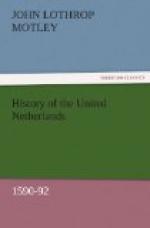This seems sufficiently harsh, but war is not a pastime nor a very humane occupation. The result was, that robbery disappeared, and it is better for all that enlisted men should be soldiers rather than thieves. To secure the ends which alone can justify war—and if the Netherlanders engaged in defending national existence and human freedom against foreign tyranny were not justifiable then a just war has never been waged— a disciplined army is vastly more humane in its operations than a band of brigands. Swift and condign punishments by the law-martial, for even trifling offences, is the best means of discipline yet devised.
To bring to utmost perfection the machinery already in existence, to encourage invention, to ponder the past with a practical application to the present, to court fatigue, to scorn pleasure, to concentrate the energies on the work in hand, to cultivate quickness of eye and calmness of nerve in the midst of danger, to accelerate movements, to economise blood even at the expense of time, to strive after ubiquity and omniscience in the details of person and place, these were the characteristics of Maurice, and they have been the prominent traits of all commanders who have stamped themselves upon their age. Although his method of war-making differed as far as possible from that quality in common, of the Bearnese, yet the two had one personal insensibility to fear. But in the case of Henry, to confront danger for its own sake was in itself a pleasure, while the calmer spirit of Maurice did not so much seek the joys of the combat as refuse to desist from scientific combinations in the interests of his personal safety. Very frequently, in the course of his early campaigns, the prince was formally and urgently requested by the States-General not to expose his life so recklessly, and before he had passed his twenty-fifth year he had received wounds which, but for fortunate circumstances, would have proved mortal, because he was unwilling to leave special operations on which much was depending to other eyes than his own. The details of his campaigns are, of necessity, the less interesting to a general reader from their very completeness. Desultory or semi-civilised warfare, where the play of the human passions is distinctly visible, where individual man, whether in buff jerkin or Milan coat of proof, meets his fellow man in close mortal combat, where men starve by thousands or are massacred by town-fulls, where hamlets or villages blaze throughout whole districts or are sunk beneath the ocean—scenes of rage, hatred, vengeance, self-sacrifice, patriotism, where all the virtues and vices of which humanity is capable stride to and fro in their most violent colours and most colossal shape where man in a moment rises almost to divinity, or sinks beneath the beasts of the field—such tragical records of which the sanguinary story of mankind is full—and no portion of them more so than the Netherland chronicles appeal more vividly




